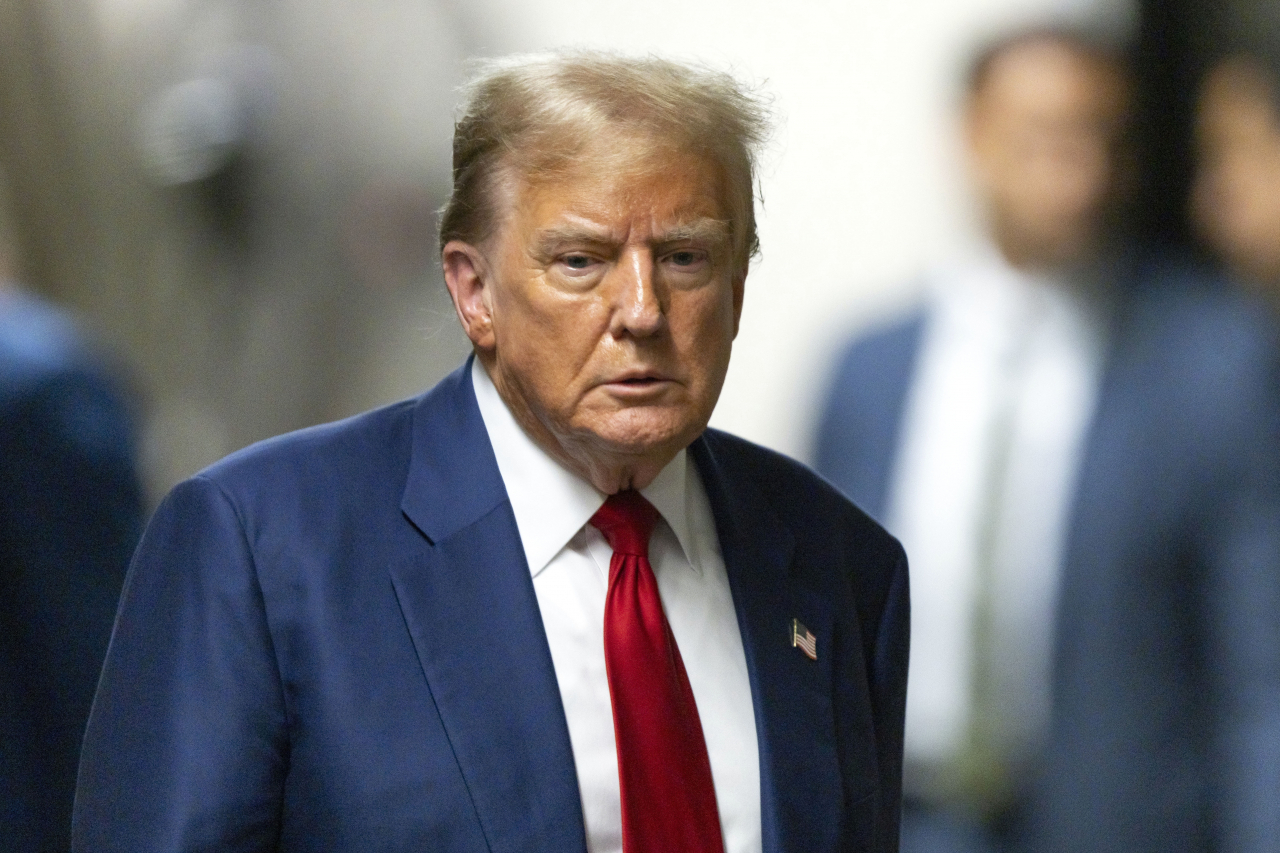
Former US President Donald Trump has criticized South Korea's contribution to US Forces expenses, claiming they were "free of charge," and scrutinized the Biden administration's defense cost-sharing talks with South Korea.
"I want South Korea to treat us properly," Trump, the presumptive Republican nominee for the 2024 presidential election in November, said during his interview with Time magazine released Tuesday.
Trump reiterated his long-standing personal belief that allies often benefit from US security guarantees without adequately sharing the burden of defense costs, with South Korea, a key Asian treaty ally, being no exception.
"From what I'm hearing, they were able to renegotiate with the Biden Administration and bring that number way, way down to what it was before, which was almost nothing," Trump said.
The former US president, who reportedly proposed the complete withdrawal of US forces from South Korea according to a memoir released in 2022 written by former Secretary of Defense Mark Esper, subsequently raised questions about the legitimacy of US Forces Korea.
"Which doesn't make any sense. Why would we defend somebody? And we’re talking about a very wealthy country. But they're a very wealthy country and why wouldn't they want to pay?" he added during the interview.
Trump repeatedly expressed dissatisfaction with South Korea's treatment of the US regarding financial contributions, especially given the presence of US forces stationed near North Korea, but citing inaccurate anecdotes regarding the scale of the USFK.
"We have 40,000 troops, and in a somewhat precarious position, to put it mildly, because right next door happens to be a man I got along with very well, but a man who nevertheless, he’s got visions of things," Trump was quoted as saying, even though only around 28,500 US troops are stationed in South Korea.
The man Trump was referring to here likely refers to North Korean leader Kim Jong-un, with whom he had three in-person meetings between 2018 and 2019.
"I told South Korea that it's time that you step up and pay. They’ve become a very wealthy country. We've essentially paid for much of their military, free of charge. And they agreed to pay billions of dollars. And now probably now that I’m gone, they're paying very little," he said.
Trump's claim that South Korea had agreed to contribute "billions of dollars" is also inaccurate.
In 2021, both countries agreed that South Korea would contribute $1.03 billion for defense-cost sharing, representing a 13.9 percent increase from its payments in 2019 and 2020. Additionally, from 2022 to 2025, they agreed to raise defense cost-sharing according to South Korea's defense budget growth rate from the previous year.
Throughout the Trump administration from 2017 to 2021, Seoul and Washington encountered persistent challenges in reaching a consensus on South Korea's contribution to the stationing of US Forces Korea.
During his term, Trump pursued a huge increase, requesting South Korea to pay more than five times the previous amount, totaling around $5 billion.
Negotiations for the 11th Special Measures Agreement, which lays the foundation for South Korea's cost-sharing contributions to US Forces Korea, began in September 2019. After over 18 months, the talks finally concluded in March 2021, shortly after Biden's inauguration, not under the Trump administration.
Seoul and Washington commenced negotiations for the 10th SMA in March 2018 but concluded them in February 2019. However, they only managed to reach an agreement on a one-year deal for 2019, which was an exceptional case given that multiyear deals are more customary in such negotiations.
Trump's comments have drawn attention, particularly as Seoul and Washington have initiated negotiations for the 12th SMA, which is slated to take effect in 2026. These negotiations have started almost 20 months ahead of the expiration of the current agreement in 2025.
Observers noted that the decision by both sides to kickstart defense cost-sharing talks early may have been influenced by the upcoming US presidential election in November, where President Joe Biden faces a rematch with Trump.
The first round of talks took place from April 23 to 25 in Honolulu, Hawaii, during which the Foreign Ministry stated that both sides "explained their respective positions" on the 12th SMA.
![[Grace Kao] American racism against Stray Kids](http://res.heraldm.com/phpwas/restmb_idxmake.php?idx=645&simg=/content/image/2024/05/13/20240513050827_0.jpg&u=)




